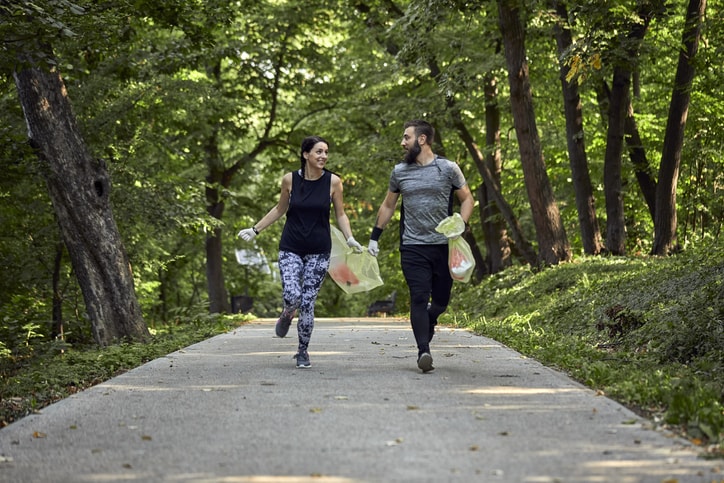Tuesday, October 17, 2023
It began in Stockholm in 2017, and now there are more than 20,000 people around the world who combine outdoor physical activity with picking up litter. An estimated 45,000 kilos of waste have been collected in Spain since 2020.
By Sandra Carbajo
Swede Erik Ahlström used to go jogging every morning in his hometown of Stockholm. On these jogs, he always found garbage in nature, scattered in places where it should not be. So he decided to take a bag with him and pick up all the garbage he found on his way. Other people began to imitate Ahlström, creating, almost without realizing it, a new sport: plogging.
"Any outdoor physical activity works great in combination with plogging, as it consists of collecting the waste that we find while we are doing sport, both on land and in water," explained Beatriz Soliva, director of Institutional Relations of Plogging Tour. So, walking, running, jogging, hiking, kayaking, paddle surfing, diving, or snorkeling fit perfectly with this activity. In fact, the word plogging comes from the combination of plogga (to pick up, in Swedish) with jogging.
Since Ahlström and his peers began in 2017, virtually every continent has joined in plogging. "Although we do not have exact data because it is not a federated sport, we know that people do this activity in about 110 countries. It is estimated that more than 20,000 people do it daily in the US, Mexico, Costa Rica, Cuba, Argentina, Japan, and Australia. And, of course, in Europe, with the Scandinavian countries in the lead, it is also in Germany, the United Kingdom, France, Italy, and Spain," Soliva noted.
The fact that it is not an organized sport makes it difficult to obtain data at a global level. In Spain, the Plogging Tour community provides this context. "In 2020, when we started our tour in Ibiza, we had set the goal for ourselves of collecting 33,000 kilos of garbage. Today, fully in the third edition of our tour, we have collected more than 45,000 kilos," Beatriz explained. In these three years, they have toured 13 Spanish cities, giving visibility to this sport that cleans the planet, through sessions for all ages, where they do routes with plogger hosts or challenges for companies and public institutions, among other activities.
The most commonly collected waste? Soliva told us that generally it is plastic. It is very common on beaches, in addition to cigarette butts, glass in the areas of outdoor parties. "Although it may seem unbelievable, we have sometimes found bulky items, such as wheels, household appliances, and bathroom fixtures," she specified. There is paper and cardboard also, but in smaller quantities. In fact, "sometimes they have deteriorated so much that they can't even be recycled and we have to throw them in the trash," the Plogging Tour spokeswoman emphasized. Obviously, plogging not only involves collecting, but also separating and recycling each waste product in the right container, which many of us are familiar with.
Tips for plogging
This activity is a sport, so the Plogging Tour community recommends that it is very important to warm up before starting. "You can't run, jog, or do any kind of sport without a five or ten minute warm-up beforehand." Beatriz also advises keeping the weather conditions in mind and always staying hydrated before, during, and after exercise, in addition to protecting yourself from the sun with sunscreen and a cap.
It is important to wear comfortable shoes, breathable clothing, and the equipment for the sport you are doing. For cycling, for example, do not forget to wear a helmet. Also bring a bag, preferably biodegradable, and gloves to protect your hands. If you will be plogging outside of daylight hours, it is important to wear a reflective vest or brightly colored clothing that can be seen even without light.
During the activity, garbage collection can be combined with squats and dead weights, but always remember to stay in healthy postures to avoid injury. "Afterwards, it is best to wash your hands thoroughly stretch so you do not stop the activity all at once and your body gradually returns to rest," Soliva asserted.
Plogging is ageless and so simple that you do not have to be an advanced athlete to become a plogger. While shopping or taking a walk, you can pick up any trash you see on the ground, just as Erik Ahlström did in his hometown of Stockholm. "The planet is our home, and we're really not treating it very well. Those of us who are adults have a choice and an obligation to leave a cleaner, more livable, and healthier world for future generations. It is an individual and collective responsibility because no one is going to do it for us," Beatriz Soliva concluded.
¿Te ha parecido interesante?





